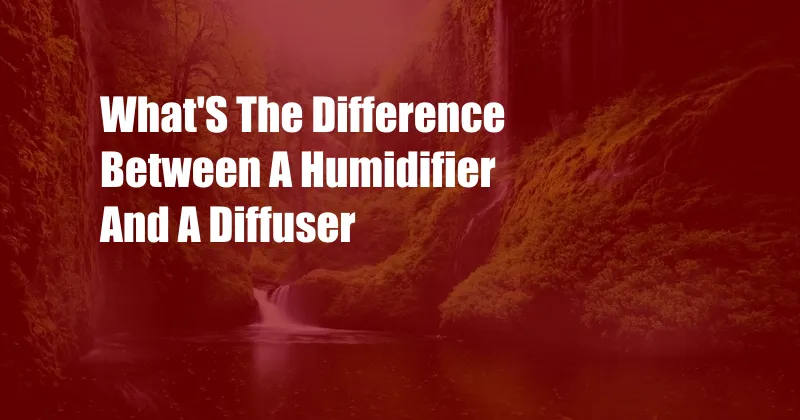
What’s the Difference Between a Humidifier and a Diffuser?
In the depths of winter, as the air outside grew crisp and cold, I found myself longing for a way to bring a touch of moisture back into my dry, stuffy home. I had heard whispers of two magical devices that promised to do just that: humidifiers and diffusers. But what was the difference between these two enigmatic appliances? Determined to find out, I embarked on a quest to unravel the mysteries of humidifiers and diffusers.
Along the way, I discovered that these two devices, while similar in purpose, are as distinct as night and day in their methods. Join me on a journey of exploration as we delve into the world of humidifiers and diffusers, unlocking their secrets and empowering you to make an informed choice for your home.
Humidifiers: The Moisture Masters
Humidifiers are like tiny water whisperers, gently releasing moisture into the air. Their primary mission is to combat dry air, which can wreak havoc on our health and well-being. By increasing the humidity levels in your home, a humidifier can alleviate a myriad of ailments, including dry skin, irritated sinuses, and even snoring.
There are two main types of humidifiers: evaporative and ultrasonic. Evaporative humidifiers use a wick or filter to absorb water and release it into the air through evaporation. Ultrasonic humidifiers, on the other hand, use ultrasonic vibrations to create microscopic water droplets that are dispersed into the air. Both types of humidifiers are effective at adding moisture to the air, but ultrasonic humidifiers tend to be quieter and more energy-efficient.
Diffusers: The Scent Sensations
Diffusers, on the other hand, are all about aromatherapy. They use a combination of water and essential oils to create a fragrant mist that can diffuse throughout your home. Essential oils are natural plant extracts that possess a wide range of therapeutic properties. By inhaling the diffused essential oils, you can experience a variety of benefits, including relaxation, stress relief, and improved sleep.
There are two main types of diffusers: ultrasonic and nebulizing. Ultrasonic diffusers use ultrasonic vibrations to break down the essential oils into tiny particles that are then dispersed into the air. Nebulizing diffusers, on the other hand, use a stream of air to atomize the essential oils, creating a finer and more concentrated mist. Nebulizing diffusers are generally more expensive than ultrasonic diffusers, but they also produce a stronger and more effective aroma.
Latest Trends and Developments in Humidifiers and Diffusers
The world of humidifiers and diffusers is constantly evolving, with new technologies and features emerging all the time. Here are some of the latest trends and developments to watch for:
- Smart humidifiers and diffusers: These devices can be controlled via a mobile app, allowing you to adjust settings and monitor humidity levels from anywhere.
- Humidifiers with built-in air purifiers: These devices combine the benefits of a humidifier with the ability to remove pollutants from the air.
- Diffusers with multiple functions: Some diffusers now offer additional features, such as a night light or a white noise machine.
Tips and Expert Advice for Choosing the Right Humidifier or Diffuser
Choosing the right humidifier or diffuser for your needs can be a daunting task. Here are some tips and expert advice to help you make an informed decision:
- Consider your home’s size: The size of your home will determine the capacity of the humidifier or diffuser you need.
- Think about your needs: If you’re primarily interested in adding moisture to the air, a humidifier is the best choice. If you’re looking to enjoy the benefits of aromatherapy, a diffuser is a better option.
- Read reviews: Before you buy, take some time to read reviews of different humidifiers and diffusers. This will give you a good idea of the pros and cons of each model.
FAQ on Humidifiers and Diffusers
Q: What’s the difference between a warm mist and a cool mist humidifier?
A: Warm mist humidifiers heat the water before releasing it into the air, while cool mist humidifiers do not. Warm mist humidifiers can be more effective at adding moisture to the air, but they can also be more expensive and energy-consuming.
Q: Can I use essential oils in a humidifier?
A: No, you should not use essential oils in a humidifier. Humidifiers are designed to release water vapor into the air, and adding essential oils can damage the device.
Q: How often should I clean my humidifier or diffuser?
A: You should clean your humidifier or diffuser according to the manufacturer’s instructions. Generally speaking, you should clean your humidifier or diffuser at least once a week.
Conclusion
Whether you’re looking to combat dry air or enjoy the benefits of aromatherapy, humidifiers and diffusers can be a great addition to your home. By understanding the differences between these two devices, you can make an informed decision and choose the best one for your needs. So, are you ready to enhance your home environment with the soothing power of a humidifier or the fragrant embrace of a diffuser?